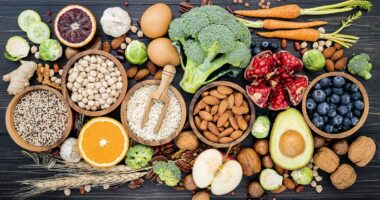Cardiovascular disease is a huge issue in the UK, accounting for around a quarter of all deaths every year. It includes a range of diseases that affect the heart and circulatory system such as coronary heart disease, heart failure and stroke.
There are a number of factors that can increase your risk for heart problems. Some are beyond our control such as genetics and age.
However, others are lifestyle habits such as what we eat. Diet influences whether a person is overweight, has high blood pressure, high cholesterol or type 2 diabetes, which are all risk factors of cardiovascular disease.
With this in mind, one expert explained how diet could help protect the heart. Speaking to Business Insider, Victoria Taylor – senior dietitian at the British Heart Foundation, firstly recommended taking a whole diet approach if you want to improve heart health.
This means that it’s what you eat most of the time that matters. And some of the foods that can help may come as a surprise.
“I don’t think that there are any superfoods,” Victoria said. “There are no kinds of magic ingredients that you can put into your diet that will right all of the other wrongs that are in there.”
Research has consistently shown that eating a Mediterranean-style diet, packed with plenty of fruits and vegetables, whole grains, nuts, seeds, lean proteins, and healthy fats, is the best diet for heart health, Victoria said.
Eating less red and processed meat is also a step in the right direction because they contain lots of salt and saturated fat.
She added that it’s OK to have the odd indulgent snack or meal.
But she specifically recommended three surprising foods that could benefit your heart.
“They’re cheap, and you might already have them in your cupboards,” she said.
Frozen peas
Victoria advised always keeping a bag of frozen peas in the freezer.
“They’re cheap, there’s no waste, and there’s no preparation really apart from obviously cooking,” she said.
This is because they’re a good source of plant-based protein and also contain vitamin C, which helps to protect cells and keep them healthy.
Peas are also high in fibre: a 100-gram portion has five grams.
According to Victoria, fibre can help lower the body’s absorption of cholesterol – a risk factor for heart disease.
Peanuts
These are ideal if you want a heart-healthier alternative to a cookie or piece of cake when snacking – but in moderation.
“We hear a lot about nuts and seeds, and often they’re quite expensive and quite exotic,” Victoria said.
However, peanuts are affordable and easily available for most people.
More specifically, unsalted, uncoated peanuts are a rich source of unsaturated fats, particularly monounsaturated fats, and contain fibre, protein, and a variety of vitamins and minerals, all of which are needed in a balanced diet.
Rapeseed oil
Perhaps most surprising on the list is rapeseed oil, which is sometimes sold as vegetable oil.
Some nutritionists have warned against eating rapeseed oil, however, there is no reliable data to back this up.
Victoria said rapeseed oil is a good option for heart health, particularly for people on a budget.
It contains mainly monounsaturated fats, she said, which help protect the heart by maintaining levels of “good” HDL cholesterol while reducing levels of “bad” LDL cholesterol in the blood.
It’s safe to cook with rapeseed oil, and it’s cheaper than olive oil, she said.









